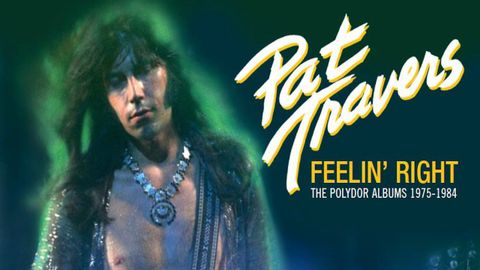Check out the title. You’d assume that this four-CD set comprises every album Pat Travers recorded for Polydor during his decade-long association with the label, wouldn’t you?
Wrong. Missing is 1980’s Crash And Burn, his highest-charting release (No.20 in the US) and the one with his best song, Snortin’ Whisky. Why the omission? Apparently, “it wouldn’t fit… and anyway, it’s available as a budget-price release on its own”. Or the compiler drank too much cocaine and promptly forgot about it.
What we’re left with is an eight-album Traverse through Pat’s career, from 1975’s self-titled debut through to 1984’s Hot Shot. Now, with the honourable exception of Alex Lifeson, the term ‘Canadian guitarist’ fills one with dread, similar to ‘Albanian dentist’.
Travers is one such (Canadian guitarist, that is), ploughing a furrow of dispiriting competency, always simmering, never sizzling. Even his second-best song – Boom Boom (Out Goes The Lights) – sounds curiously restrained; a minor short-circuit rather than a full-on electrical catastrophe. The quality of the musicianship is undeniable – the likes of Nicko McBrain, Tommy Aldridge and Pat Thrall featuring in the ranks – but Travers’ timid blues rock is too muffled and straitjacketed to stir the senses.
Matters reach a nadir with 1981’s Radio Active and the following year’s Black Pearl: keyboard-dominated affairs both, the latter including an inexplicable Beethoven freakout (The Fifth) and a rent-a-dread version of Bob Marley’s Misty Morning. Oh, and Amgwanna Kick Booty is every bit as terrible as its name suggests./o:p


